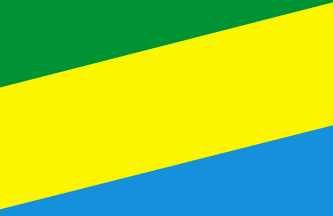
This page is part of © FOTW Flags Of The World website
Mariana Pimentel, Rio Grande do Sul (Brazil)
Last modified: 2020-07-31 by ian macdonald
Keywords: rio grande do sul | mariana pimentel |
Links: FOTW homepage |
search |
disclaimer and copyright |
write us |
mirrors
 image by Dirk Schönberger,
27
February 2012
image by Dirk Schönberger,
27
February 2012
Source:
http://pt.wikipedia.org/wiki/Mariana_Pimentel
See also:
The municipality of Mariana Pimentel (3,926 inhabitants in 2016; 33,813 ha)
is located 100 km south-west of Porto Alegre.
Mariana Pimentel was
settled in 1784 by Polish immigrants, soon joined by Italian and German
immigrants. Mariana Pimentel was elevated in 1915 to the 9th district of Porto
Alegre, to be transferred in 1926 to the newly established municipality of
Guaíba as its 3rd district.
The municipality of Mariana Pimentel was
established by State Law No. 9,611 promulgated on 20 March 1992.
https://www.marianapimentel.rs.gov.br/
Municipal website
Ivan Sache, 31 July 2020
Symbols
The flag and arms of Mariana Pimentel are prescribed by
Municipal Law No. 96 promulgated on 9 December 1994.
Article 4.
The
design of the flag of the municipality of Mariana Pimentel obeys the following
rules.
a) The flag's width shall be of 14 units.
b) The flag's length
shall be of 20 units.
c) The coat of arms shall be placed in the center of
the flag, in width 4.1 units.
[...]
Article 6.
The flag is composed
of three transversal stripes of equal width.
[...]
The stripes shall have
the following colors.
I. Upper third: Light green (50%);
II. Central
stripe: Golden yellow;
III. Lower third: Celestial blue.
Article 9.
The coat of arms of the municipality, according to the heraldic norms, shall be
composed of four colors: gules (red), vert in medium shade (light green, 50% of
dark green), sable (black) and maroon, and two metals, or (gold) and argent, as
follows:
I. On a shield of Portuguese shape, diagonally divided by two
parallel stripes of equal width that form three equal parts, or distinct fields.
II. The upper stripe shall be gules (red) and the lower vert (green).
III.
The shield's background features three divisions formed by the aforementioned
stripes: the upper part, light green (vert at medium shade), the central field
or (gold) and the lower argent.
IV. The metallic colors or (gold) and argent,
which are the official and preferred colors for the coat of arms, can be
substituted for the sake of production by golden yellow (gold) and white
(argent), always in the combination gold/argent or yellow/white.
IV. In the
chief's dexter canton (upper left canton for the viewer) is featured a tractor
sable (black) and argent.
V. In the shield's center, inscribed in an ellipse,
in the center a mate calabash with mate shaped as Cerro Negro, light green and
with a brown and white straw. The background is the flag of Rio Grande do Sul,
the coat of arms excluded, in its proper colors and design.
VI. The shield is
surmounted by five traditional towers representing the Jesus, Mary and Joseph
fortifications, historical landmarks of the Riograndense past.
VII. In the
chief's sinister canton (upper right canton for the viewer) is featured a brown
and argent bull's head.
VIII. Beneath, a mountain and the brown swinging
stone located on Mato do Bier, beneath at its right six eucalyptus side by side,
in green (vert) and brown.
IX. In the base's dexter canton (lower left canton
for the viewer) is featured Cerro Negro in green, light green (vert) and gold
(or).
X. Beneath the shield, the motto "26.3 MARIANA PIMENTEL 1992" on a
scroll argent with its upper and lower borders in red (gules) and green (vert),
respectively.
XI. The shield supported dexter (viewer's left) by a plant of
sweet potato with a tubercle green at medium shade, and sinister (viewer's
right), green (vert) tobacco leaves.
Article 10. The elements of the coat
of arms of Maria Pimentel represent:
a) Tractor: A symbol of mechanized
agriculture and of the municipality's typical rural activity.
b) Bull's head:
Cattle-breeding, the municipality's main source of income.
c) Red diagonal
stripe: The establishment of the first Polish immigrants and the introduction of
their habits and permanent traditions in Marian Pimentel.
d) Green diagonal
stripe: The subsequent establishment of the first Italian immigrants and their
ethnic and cultural collaboration.
e) Gaúcho calabash: Part of the flag of
Rio Grande do Sul; a Gaúcho tradition deeply rooted in the municipality and the
pride of the contribution to the Riograndense history.
f) Cerro Negro (Black
Hill): The municipality's highest point, of outstanding natural beauty,
overlooking the municipality.
g) The Mato do Bier swinging stone, a monolith
of big size, characterizing the municipality's tourism potential.
h)
Eucalyptus regularly arranged: Complement to tobacco growing and bee-keeping,
with energetic potential and protection of environment, as a substitute to
native species.
i) Sweet potato plant: The municipality's main agricultural
activity and a main source of income.
j) Tobacco leaves: The Municipality's
second agricultural production.
https://leismunicipais.com.br/a/rs/m/mariana-pimentel/lei-ordinaria/1994/10/96/lei-ordinaria-n-96-1994-institui-os-simbolos-do-municipio-suas-formas-e-apresentacao-e-da-outras-providencias
Leis Municipais database
The flag in actual use features the municipal
coat of arms inscribed in a white disc.
Photo
https://www.facebook.com/prefeituramunicipalde.marianapimentel/photos/a.1024937474185157/2382249745120583/?type=3&theater
The flag is also used with the coat of arms directly applied on the flag's
field.
Photo
https://www.facebook.com/prefeituramunicipalde.marianapimentel/photos/a.1024937474185157/1654308564581375/?type=3&theater
Ivan Sache, 31 July 2020
 image by Dirk Schönberger,
27
February 2012
image by Dirk Schönberger,
27
February 2012
 image by Dirk Schönberger,
27
February 2012
image by Dirk Schönberger,
27
February 2012